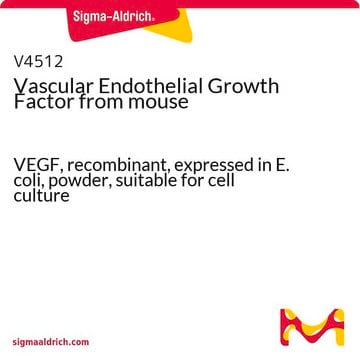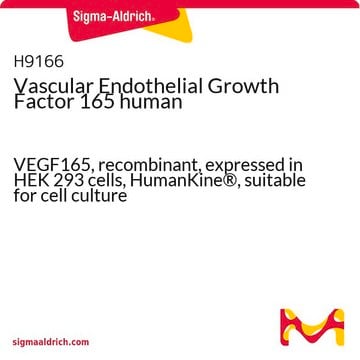GF315
VEGF165 Protein, Human Recombinant Animal Free
The Vascular endothelial growth factor (VEGF or VEGFA) is a potent mediator of both angiogenesis & vasculogenesis in the fetus & adult. Manufactured using all non-animal reagents.
Synonim(y):
Vascular Endothelial Growth Factor 165, VEGF-165, VEGF, Vascular Endothelial Growth Factor, VEGF-A
Zaloguj sięWyświetlanie cen organizacyjnych i kontraktowych
About This Item
Kod UNSPSC:
12352202
eCl@ss:
32160405
NACRES:
NA.77
Polecane produkty
Poziom jakości
Próba
>98% (SDS-PAGE and HPLC)
zanieczyszczenia
<0.1 μg/mg protein endotoxin (<1EU/μg)
numer dostępu NCBI
numer dostępu UniProt
Warunki transportu
dry ice
Powiązane kategorie
Opis ogólny
Product Source: E. coli
Vascular endothelial growth factor (VEGF or VEGFA) is a potent mediator of both angiogenesis and vasculogenesis in the fetus and adult. Humans express alternately spliced isoforms of 121, 145, 165, 183, 189, and 206 amino acids (aa) in length. VEGF165 appears to be the most abundant and potent isoform, followed by VEGF121 and VEGF189. VEGF is a potent growth and angiogenic cytokine. It stimulates proliferation and survival of endothelial cells, and promotes angiogenesis and vascular permeability. Expressed in vascularized tissues, VEGF plays a prominent role in normal and pathological angiogenesis. Substantial evidence implicates VEGF in the induction of tumor metastasis and intra-ocular neovascular syndromes. VEGF signals through the three receptors; fms-like tyrosine kinase (flt-1), KDR gene product (the murine homolog of KDR is the flk-1 gene product) and the flt4 gene product. Recombinant human VEGF is a 38.2 kDa disulfide-linked homodimeric protein consisting of two 165 amino acid polypeptide chains.
Specyficzność
Cross Reactivty
Mouse, Rat, Pig, Hamster, Trout, Green Algae, Sheep, Cow, Rabbit, Guinea Pig
Mouse, Rat, Pig, Hamster, Trout, Green Algae, Sheep, Cow, Rabbit, Guinea Pig
Zastosowanie
Research Category
Stem Cell Research
Stem Cell Research
Research Sub Category
Growth Factors & Receptors
Growth Factors & Receptors
Jakość
Bioactivity assay: Determined by the dose-dependent stimulation of the proliferation of human umbilical vein endothelial cells (HUVEC) using a concentration range of 1.0-8.0 ng/ml.
Postać fizyczna
Product is filtered through a 0.2 micron filter before lyophilization.
Recombinant animal free human VEGF165 is manufactured using all non-animal reagents
Przechowywanie i stabilność
Store at -20°C for up to 6 months from date of receipt.
Oświadczenie o zrzeczeniu się odpowiedzialności
Unless otherwise stated in our catalog or other company documentation accompanying the product(s), our products are intended for research use only and are not to be used for any other purpose, which includes but is not limited to, unauthorized commercial uses, in vitro diagnostic uses, ex vivo or in vivo therapeutic uses or any type of consumption or application to humans or animals.
Kod klasy składowania
11 - Combustible Solids
Klasa zagrożenia wodnego (WGK)
WGK 1
Temperatura zapłonu (°F)
Not applicable
Temperatura zapłonu (°C)
Not applicable
Certyfikaty analizy (CoA)
Poszukaj Certyfikaty analizy (CoA), wpisując numer partii/serii produktów. Numery serii i partii można znaleźć na etykiecie produktu po słowach „seria” lub „partia”.
Masz już ten produkt?
Dokumenty związane z niedawno zakupionymi produktami zostały zamieszczone w Bibliotece dokumentów.
John P Morgan et al.
Nature protocols, 8(9), 1820-1836 (2013-08-31)
This protocol describes how to form a 3D cell culture with explicit, endothelialized microvessels. The approach leads to fully enclosed, perfusable vessels in a bioremodelable hydrogel (type I collagen). The protocol uses microfabrication to enable user-defined geometries of the vascular
Wutigri Nimlamool et al.
Molecular biology of the cell, 26(15), 2755-2768 (2015-06-13)
Gap junctions (GJs) exhibit a complex modus of assembly and degradation to maintain balanced intercellular communication (GJIC). Several growth factors, including vascular endothelial growth factor (VEGF), have been reported to disrupt cell-cell junctions and abolish GJIC. VEGF directly stimulates VEGF-receptor
Nasz zespół naukowców ma doświadczenie we wszystkich obszarach badań, w tym w naukach przyrodniczych, materiałoznawstwie, syntezie chemicznej, chromatografii, analityce i wielu innych dziedzinach.
Skontaktuj się z zespołem ds. pomocy technicznej






